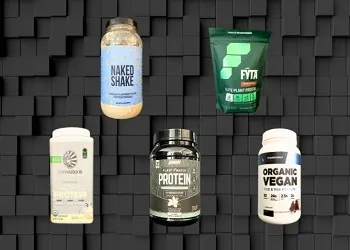Can L-glutamine cause constipation? Does L-glutamine make you poop? These are all common questions concerning taking dietary glutamine supplements to reduce symptoms of irritable bowel syndrome (IBS).
One of the nonessential amino acids, glutamine, is linked to various health benefits, such as removing excess ammonia, a toxic waste, from the human body. L-glutamine for IBS has numerous benefits, from alleviating constipation to protecting the mucous membrane of the digestive system.
Keep reading for more information on IBS and how L-glutamine can help prevent constipation and promote healthy bowel movements.
Table of Contents
IBS: Symptoms and Causes

Irritable bowel syndrome is estimated to affect around 15% of the population, with a higher risk in women than men. Understanding what the condition is, what agitates it, and what can help reduce the uncomfortable symptoms that arise with it, such as glutamine supplementation, can greatly benefit anyone with IBS. Find out more about the condition and how L-glutamine for IBS can be helpful below!
What Is It?
Irritable bowel syndrome is a condition that affects the digestive system, including gut function. Individuals with IBS have gut microbiota abnormalities that lead to intestinal problems, including inflammation and pain.
There are a few categories of IBS, including:
- Diarrhea predominant (IBS-D)
- Constipation predominant (IBS-C)
- Diarrhea constipation mixed (IBS-M)
- Post-infectious (PI-IBS)
- Undefined subtype (IBS-U)
IBS is different from inflammatory bowel disease (IBD), though the two are often compared. While IBS is a chronic syndrome with specific symptoms, IBD refers explicitly to the chronic inflammation of the intestines. Though the IBD and IBS symptoms are often interchangeable and having both at the same time is possible, they are not the same.
Symptoms of IBS
IBS symptoms affect the overall quality of life for many individuals. The symptoms of this syndrome vary per person, with some individuals experiencing more severe symptoms and others only mild ones.
Those with IBS may find relief after using the bathroom. Others may find that the GI symptoms of IBS may intensify during times of stress or after eating particular foods.
Symptoms of IBS:
- Abdominal pain
- Abnormal stool frequency
- Changes in bowel habits
- Bloating
- Cramping
- Excessive flatulence
Causes
There is no definitive cause of IBS as research continues to examine this syndrome. It is believed that a combination of issues may lead to IBS and its symptoms. Some experts believe that problems with brain-gut interactions cause IBS, though this hypothesis is still being examined.
Causes of IBS:
- Small intestinal bacterial overgrowth
- Bacterial infections
- Dietary intolerance
- Mental disorders (depression, anxiety, somatic symptom disorder)
- Food passing through the gut too quickly/slowly
- Stress
- Family history of IBS
- Oversensitive nerves in the gut
Risks If Left Untreated
Though IBS is not an inherently dangerous condition, if left untreated, there are potentially negatively impactful concerns that can arise.
Risks of untreated IBS:
- Increased intestinal permeability
- Intestinal diseases
- Hemorrhoids
- Mood disorders
- Non-alcoholic fatty liver disease (NAFLD)
- Crohn’s disease
Symptom Alleviation
Irritable bowel syndrome management is important as it helps reduce IBS symptoms and prevent severe concerns of untreated IBS, such as mood disorders or hemorrhoids.
One of the most significant recommendations for IBS patients is a low FODMAP diet. FODMAP stands for fermentable oligosaccharides, disaccharides, monosaccharides, and polyols, which are carbohydrates in beans and wheat. Individuals who have IBS and follow a low FODMAP diet can help lessen symptoms as the FODMAPs draw more fluid into the intestine and create more gas, which increases IBS symptoms of gas and bloating.
There are a variety of other ways to help with IBS symptoms, including taking glutamine for constipation or low-dose antidepressants for reducing emotional stress that aggravates the gut’s nervous system.
Treatment for IBS:
- Diet changes
- L-glutamine supplementation
- Antibiotics
- Laxatives
- Antidiarrheal medication
- Probiotics
Benefits of Glutamine Supplementation Ffor Irritable Bowel Syndrome

Taking L-glutamine supplements has many health benefits, including the reduction of IBS symptoms. With oral glutamine supplementation, you can receive these benefits for irritable bowel syndrome. Find out what they are below!
Glutamine Supplementation Enhances Intestinal Health
A nonessential amino acid, glutamine aids in the everyday function of the human body and plays a vital role in intestinal health. It acts as a fuel source for intestinal cells, reduces constipation, regulates gut microbiota, and maintains intestinal tissue integrity. The intestinal bacteria’s utilization of amino acids is regulated by glutamine, which is crucial for supporting immune function and gut health.
L glutamine deficiency raises the risk of intestinal permeability, which can lead to leaky gut, chronic gastrointestinal diseases, and other diseases, including type 1 diabetes, fibromyalgia, and lupus.
IBS patients suffer from symptoms that arise in the digestive tract, which includes the intestines. A placebo controlled trial revealed that a glutamine supplement could benefit those with IBS as the amino acid reduced intestinal permeability and improved daily bowel movements.
Works Together With Probiotics
Can you take L-glutamine and probiotics together? Yes, you can, and we recommend it!
Probiotics are live bacteria that benefit gut health by supporting and regulating the gut microbiota. Commonly called “good” or “friendly” bacteria, probiotics do the same for intestinal microbiota, which dramatically impacts the immune system and its functions.
The disturbance of bacteria in the intestines and abnormal levels of bacteria in the gut are believed to cause uncomfortable impacts on the digestive tract and influence symptoms of IBS, including abdominal pain and irregular bowel habits.
Together, glutamine and probiotics improved gastrointestinal symptoms by reducing inflammation in the intestines and inhibiting oxidative stress. Both glutamine and probiotics can efficiently promote health in the intestines and gut to reduce the likelihood or intensity of IBS symptoms.
Alleviates Constipation
Taking L-glutamine can benefit individuals who suffer from constipation caused by IBS.
One of the many functions of glutamine is its ability to regulate gut microbes, which, when levels are unstable, can result in constipation and inflammatory bowel diseases. Glutamine can stimulate the growth of good bacteria and prevent the reproduction of harmful microorganisms in the gut. Its regulatory functions support healthy bowel movements and stool consistency, reducing constipation, a symptom of IBS.
Aids the Digestive System
As IBS greatly affects the digestive system, it’s no wonder that glutamine is a productive way of reducing symptoms.
Glutamine protects the mucous membrane of the digestive system, which is crucial for preventing bacterial infiltration during digestive processes. The mucous membrane is vital for gut health as the first line of defense against microorganisms, acids, digestive enzymes, food-associated toxins, and microbial by-products that could otherwise harm the body without proper protection and result in gastrointestinal diseases.
Side Effects of Dietary Glutamine Supplements
Before taking glutamine supplements, it’s important to first speak with your doctor to verify and understand the potential side effects associated with supplementation of the amino acid.
Can l-glutamine cause constipation? There are some potential side effects and risks, like an L-glutamine headache, that can arise from supplementing with glutamine. However, depending on the individual, they can differ or may not arise at all.
Side effects of glutamine supplements:
- Headache
- Constipation
- Nausea
- Heartburn
- Dizziness
Timing for taking L-glutamine is another factor to consider to promote the supplement’s effectiveness and reduce potential stomach upset. Consult with your doctor first to ensure there are no potential medications or conditions that may not react well with the supplementation of glutamine before taking it to reduce symptoms of IBS.
Frequently Asked Questions
Does L-glutamine cause constipation?
Although L-glutamine supplements are safe for most people, some have experienced constipation. More notoriously, glutamine is associated with improving constipation and promoting healthy bowel movements. In some cases, side effects like constipation can occur when taking supplements.
Can you take L-glutamine with probiotics?
Yes, glutamine and probiotics can be taken together. The amino acid, glutamine, and probiotics, healthy live bacteria, are both highly beneficial to promoting healthy function in the digestive tract.
Does glutamine make you poop?
The health benefits of glutamine are many, including improving symptoms of IBS to reduce factors negatively affecting one’s quality of life. A common symptom of IBS is constipation, and with the help of glutamine supplementation, the amino acid can promote healthy bowel movements by optimizing the intestinal bacteria and their composition.














